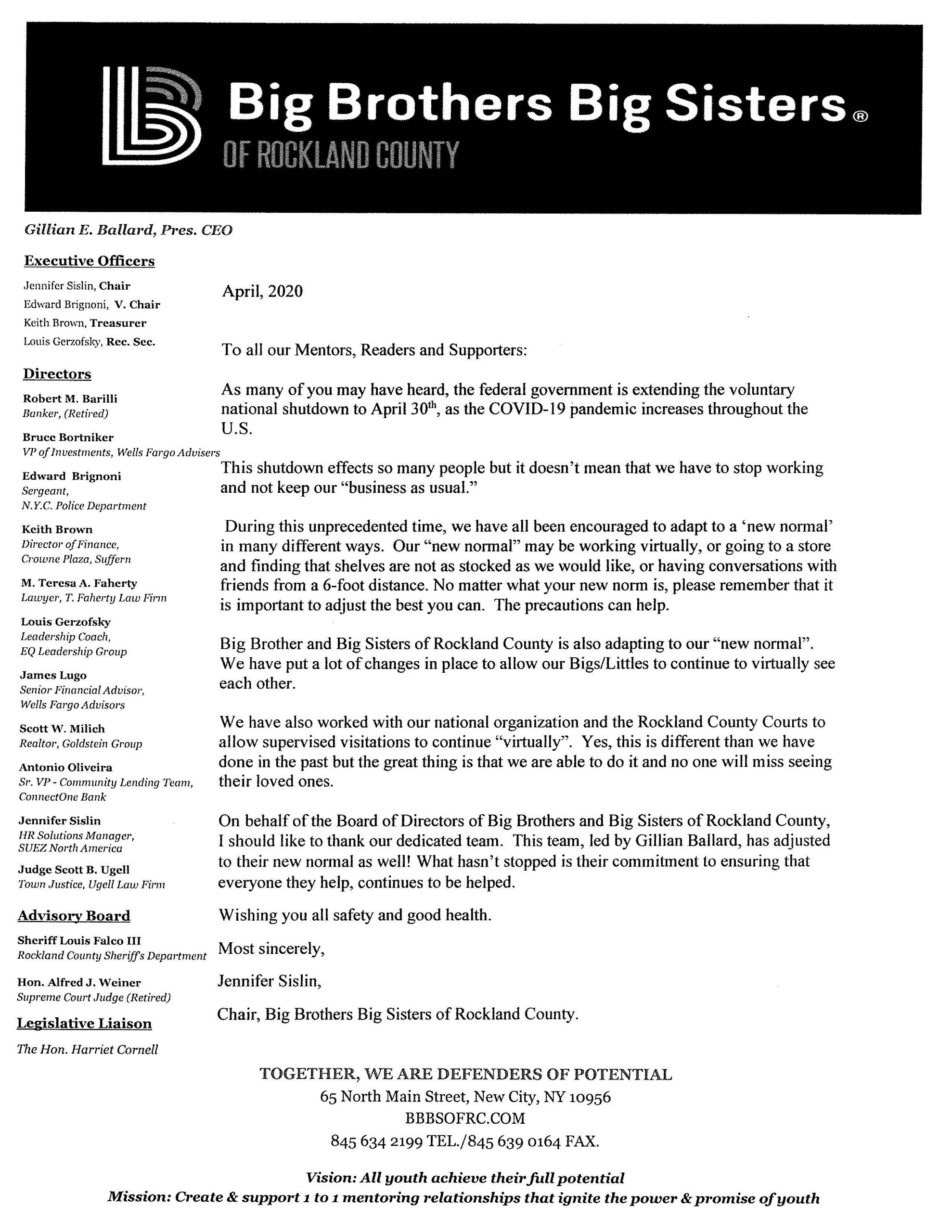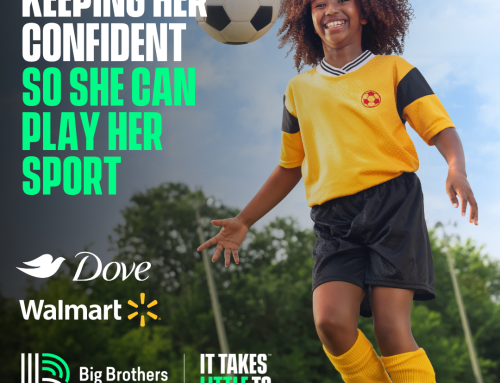To all our Mentors, Readers and Supporters:
As many of you may have heard, the federal government is extending the voluntary national shutdown to April 30th, as the COVID-19 pandemic increases throughout the U.S.
This shutdown effects so many people but it doesn’t mean that we have to stop working and not keep our “business as usual.”
During this unprecedented time, we have all been encouraged to adapt to a ‘new normal’ in many different ways. Our “new normal” may be working virtually, or going to a store and finding that shelves are not as stocked as we would like, or having conversations with friends from a 6-foot distance. No matter what your new norm is, please remember that it is important to adjust the best you can. The precautions can help.
Big Brother and Big Sisters of Rockland County is also adapting to our “new normal”. We have put a lot of changes in place to allow our Bigs/Littles to continue to virtually see each other.
We have also worked with our national organization and the Rockland County Courts to allow supervised visitations to continue “virtually”. Yes, this is different than we have done in the past but the great thing is that we are able to do it and no one will miss seeing their loved ones.
On behalf of the Board of Directors of Big Brothers and Big Sisters of Rockland County, I should like to thank our dedicated team. This team, led by Gillian Ballard, has adjusted to their new normal as well! What hasn’t stopped is their commitment to ensuring that everyone they help, continues to be helped.
Wishing you all safety and good health.
Most sincerely,
Jennifer Sislin,
Chair, Big Brothers Big Sisters of Rockland County.
TIPS ON SOCIAL DISTANCING AND OTHER PRACTICES TO HELP REDUCE THE SPREAD OF COVID-19
According to the CDC (Centers for Disease Control), the WHO (World Health Organization) and other leading health authorities, social distancing is one of the most effective ways to reduce the spread of COVID-19 and other illnesses. The following are tips to help you practice proper social distancing at work and at home.
Everyone should know of the importance of practicing everyday preventive actions that can help prevent the spread of respiratory illnesses:
- Avoid close contact with people who are sick
- If it is necessary to go to work or visit a public place, stay approximately six feet or more away from others
- Stay home when you are sick, except to get medical care
- Cover your coughs and sneezes with a tissue
- Clean frequently touched surfaces and objects daily (e.g., tables, countertops, light switches, doorknobs, and cabinet handles)
How do you disinfect surfaces for the coronavirus disease?
For disinfection, diluted household bleach solutions, alcohol solutions with at least 70% alcohol, and most common EPA-registered household disinfectants should be effective.
Can you contract the coronavirus disease by touching a surface?
People could catch COVID-19 by touching contaminated surfaces or objects – and then touching their eyes, nose or mouth.
How should I get food?
While food markets remain open and restaurants are available for take-out only (in most locations), the best option is to have your food delivered.
If I do go shopping at a market or pick up food at a restaurant, what additional precautions should I take?
When you get home with your food, you could take it out of the containers, throw those out, and then wash your hands thoroughly before eating.
What about people in good physical shape and under the age of 30?
While the elderly and those with pre-conditions are the most vulnerable, every demographic group (age, background, etc.) is susceptible to contracting the virus, especially if in close contact with others who have the disease or have been exposed. Once again, social distancing should be practiced by everyone.
What about children?
Cases in children tend to be milder. A new study in the journal Pediatrics finds that 13% of children with confirmed cases of COVID-19 didn’t show symptoms. Subsequently, children and others with mild or unnoticeable symptoms can often be carriers of the disease.
Should I visit my elderly relative or friend?
Probably not. Older individuals are the most susceptible population. Distancing yourself from elderly people protects your loved one and yourself. However, be aware that social isolation is a concern for people who live by themselves or cannot see others. Make sure to use tools at your disposal to stay in touch with others – phone, social media, video conferencing, etc.
Should I visit outdoor public places like parks and playgrounds? Can I exercise outside?
Only if social distancing can be practiced. Families can stay together, but there should be sufficient distance – six feet or more – from all other people. In general, people may go outside, but should limit their exposure to any public place.
Playgrounds in particular can be places where the virus can be transmitted through clustering or contaminated surfaces. Team sports like basketball, soccer, etc. are also discouraged at this time.
Is it OK to get together with my friends at my or someone else’s house? I know everyone and they are all healthy.
Gathering in groups of just a few people, whether indoors or outdoors, is strongly discouraged. Now is not the time for social groups, parties, get togethers, etc.








